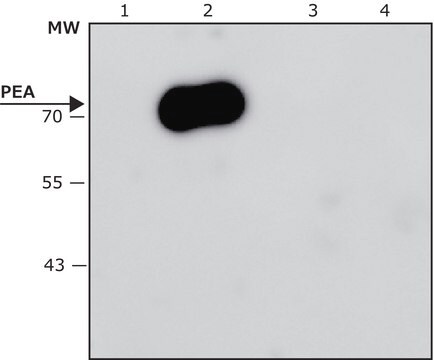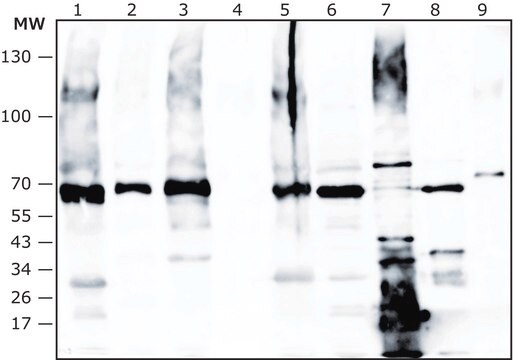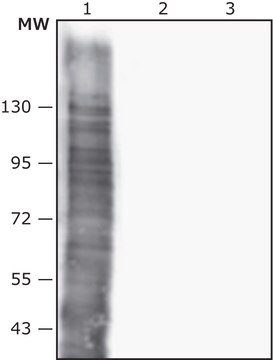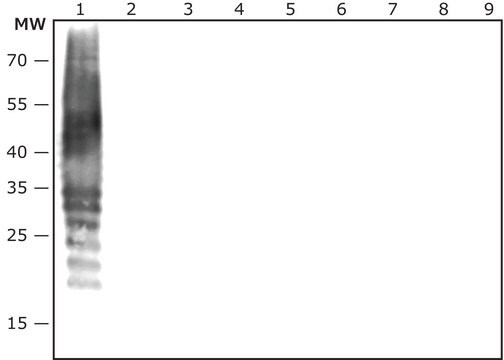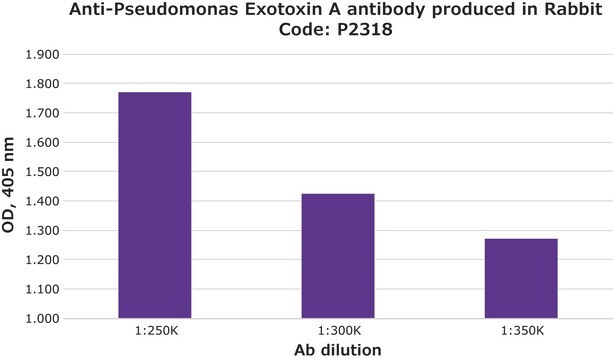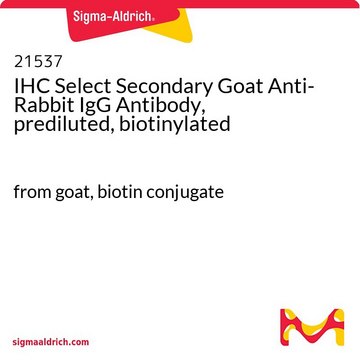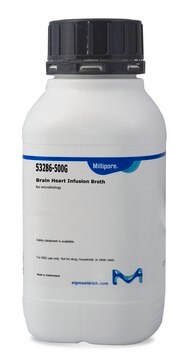推荐产品
生物源
rabbit
品質等級
抗體表格
IgG fraction of antiserum
抗體產品種類
primary antibodies
形狀
liquid
物種活性
Pseudomonas aeruginosa
包裝
pkg of 100 μL
pkg of 25 μL
濃度
~1 mg/mL
技術
immunoblotting: 1:10,000-1:20,000 using P.aeruginosa lysate
indirect ELISA: 1:5000- 1:0,000 using whole dead P.aeruginosa bacteria for coating
運輸包裝
dry ice
儲存溫度
−20°C
目標翻譯後修改
unmodified
一般說明
Pseudomonas aeruginosa is a rod shaped, gram negative, monoflagellated, aerobic to facultative anaerobe bacteria which commonly inhabits soil and aqueous environments.1,2 P.aeruginosa is considered an opportunistic human pathogen mainly causing disease in immunocompromised patients. It is especially fatal in cystic fibrosis (CF) patients, but also presents a major problem in chronic wounds, burn wounds and infection of implanted biomaterials such as catheters.3P. aeruginosa is a major cause of nosocomial infections which affect more than 2 million
patients every year and are accounted for around 90,000 deaths annually.3
It forms highly resistant biofilms on human tissues such as the lungs of CF patients or medical surfaces. Once P. aeruginosa infection is established it is extremely hard to eradicate.3
The genome of P. aeruginosa encodes a vast arsenal of virulence factors. However, the P. aeruginosa isolated from chronic infections expresses less virulence factors in comparison to isolates from acute infections but more readily form biofilms.1,4-6
patients every year and are accounted for around 90,000 deaths annually.3
It forms highly resistant biofilms on human tissues such as the lungs of CF patients or medical surfaces. Once P. aeruginosa infection is established it is extremely hard to eradicate.3
The genome of P. aeruginosa encodes a vast arsenal of virulence factors. However, the P. aeruginosa isolated from chronic infections expresses less virulence factors in comparison to isolates from acute infections but more readily form biofilms.1,4-6
特異性
Anti-P. aeruginosa antibody recognizes P. aeruginosa whole dead bacteria and lysate, the antibody has no cross reactivity with whole dead bacteria or lysate of Proteus mirabilis, Porphyromonas gingivalis, E. coli, Shigella flexneri, Enterococcus faecalis, Akkermansia muciniphila or Salmonella enterica.
應用
The antibody may be used in various immunochemical techniques including Immunoblotting and ELISA. Detection of the P. aeruginosa bands by Immunoblotting is specifically inhibited by the immunogen.
生化/生理作用
P. aeruginosa cells possess a single flagellum and type 4 pili that are important for adhesion to the host epithelial cells, motility and can also initiate an inflammatory response.1 After adhesion, P. aeruginosa activates Type 3 secretion system (T3SS) and injects cytotoxins into the host cell.1 Moreover, P. aeruginosa secretes several proteases, which can degrade host complement, mucins, and disrupt tight junctions6-7,. In addition to lipases and phospholipases, that degrade lipids in host cell membranes6, and expresses Lipopolysaccharide (LPS), that is involved in inflammatory response and antibiotic resistance8.
Antibiotic resistance to many classes of antibiotics is a major challange in P. aeruginosa treatment. P. aeruginosa possesses several resistance mechanisms such as, low permeability of the outer membrane,
expression of membrane efflux (Mex) pumps, and ß-lactamase and AmpC that hydrolases ß-lactam antibiotics such as, penicillin9. In addition, as a result of genetic transfer new resistant strains emerge constantly. Therefore, finding new prevention and treatment strategies for P. aeruginosa infection is of high importance.1
Antibiotic resistance to many classes of antibiotics is a major challange in P. aeruginosa treatment. P. aeruginosa possesses several resistance mechanisms such as, low permeability of the outer membrane,
expression of membrane efflux (Mex) pumps, and ß-lactamase and AmpC that hydrolases ß-lactam antibiotics such as, penicillin9. In addition, as a result of genetic transfer new resistant strains emerge constantly. Therefore, finding new prevention and treatment strategies for P. aeruginosa infection is of high importance.1
外觀
Supplied as a solution in 0.01 M phosphate buffered saline pH 7.4, containing 15 mM sodium azide as a preservative.
儲存和穩定性
For continuous use, store at 2-8°C for up to one month. For extended storage, freeze in working aliquots. Repeated freezing and thawing is not recommended. If slight turbidity occurs upon prolonged storage, clarify the solution by centrifugation before use. Working dilution samples should be discarded if not used within 12 hours.
免責聲明
Unless otherwise stated in our catalog our products are intended for research use only and are not to be used for any other purpose, which includes but is not limited to, unauthorized commercial uses, in vitro diagnostic uses, ex vivo or in vivo therapeutic uses or any type of consumption or application to humans or animals.
未找到合适的产品?
试试我们的产品选型工具.
儲存類別代碼
12 - Non Combustible Liquids
水污染物質分類(WGK)
WGK 1
閃點(°F)
Not applicable
閃點(°C)
Not applicable
Alexander J Laarman et al.
Journal of immunology (Baltimore, Md. : 1950), 188(1), 386-393 (2011-12-02)
The complement system rapidly detects and kills Gram-negative bacteria and supports bacterial killing by phagocytes. However, bacterial pathogens exploit several strategies to evade detection by the complement system. The alkaline protease (AprA) of Pseudomonas aeruginosa has been associated with bacterial
Tanya Strateva et al.
Journal of medical microbiology, 58(Pt 9), 1133-1148 (2009-06-17)
Pseudomonas aeruginosa is one of the leading nosocomial pathogens worldwide. Nosocomial infections caused by this organism are often hard to treat because of both the intrinsic resistance of the species (it has constitutive expression of AmpC beta-lactamase and efflux pumps
Eric E Smith et al.
Proceedings of the National Academy of Sciences of the United States of America, 103(22), 8487-8492 (2006-05-12)
In many human infections, hosts and pathogens coexist for years or decades. Important examples include HIV, herpes viruses, tuberculosis, leprosy, and malaria. With the exception of intensively studied viral infections such as HIV/AIDs, little is known about the extent to
Jerry D King et al.
Innate immunity, 15(5), 261-312 (2009-08-28)
Pseudomonas aeruginosa causes serious nosocomial infections, and an important virulence factor produced by this organism is lipopolysaccharide (LPS). This review summarizes knowledge about biosynthesis of all three structural domains of LPS - lipid A, core oligosaccharide, and O polysaccharides. In
D J Hassett
Journal of bacteriology, 178(24), 7322-7325 (1996-12-01)
Pseudomonas aeruginosa produced alginate and elevated algD (encoding GDPmannose 6-dehydrogenase) transcription under strict anaerobic conditions, especially when using nitrate as a terminal electron acceptor. Purified alginate added to bacterial suspensions caused a decrease in growth, suggesting that alginate contributes to
我们的科学家团队拥有各种研究领域经验,包括生命科学、材料科学、化学合成、色谱、分析及许多其他领域.
联系技术服务部门